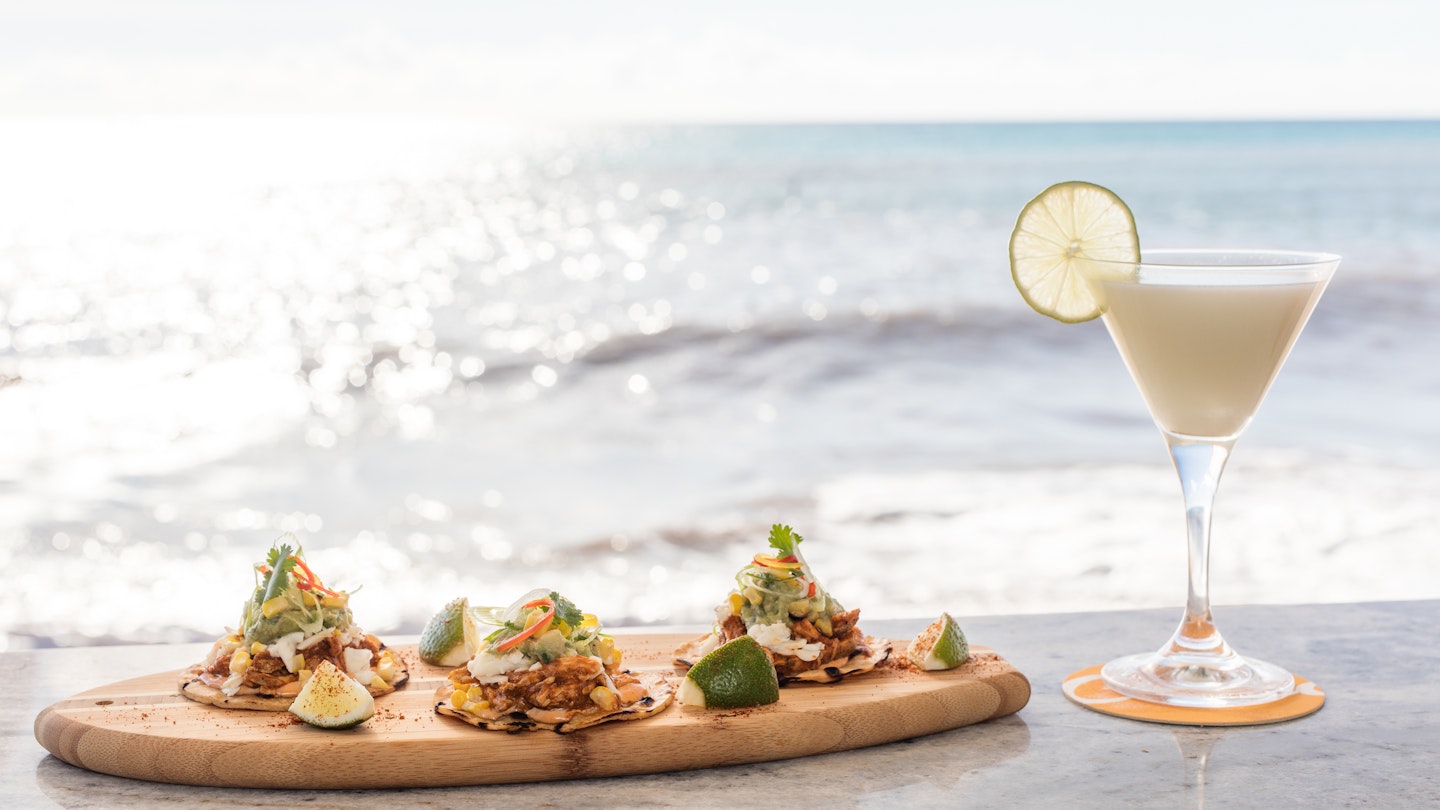The Cayman Islands
With its incredible wildlife, scuba-diving, and white sand beaches, the British Overseas Territory of the Cayman Islands has long been a draw for travelers looking for luxury and relaxation. However, it’s only been within the last couple of decades that the culinary scene on the islands has evolved to be more environmentally responsible.
Sustainability has been on the rise in Grand Cayman ever since The Brasserie, the island’s first farm-to-table restaurant, opened in 1997. Since then, the demand for local produce and sustainable seafood has grown exponentially, creating a circular effect where farms utilizing greenhouses and fishermen following eco-friendly practices now have increased capital to expand their operations.
“In Grand Cayman, we have a great outpouring of community encouragement for local farmers’ markets to showcase locally grown food items and sell products at local stands,” says Massimo De Francesca, executive chef at the Kimpton Seafire and its signature restaurant Ave.
The weekly Farmers and Artisans Market provides both restaurants and local residents access to produce and proteins from the islands. De Francesca notes that the local large-scale grocery stores also dedicate space to showcase local fruits, vegetables, honey, sauces, and more.
Ave and many other restaurants on the island also participate in a government initiative called Cayman Sea Sense. This program promotes serving fish from only sustainable, stable populations and utilizes fishing practices that minimize habitat damage and unintended by-catch.
In the future, De Francesca expresses a desire to, “increase the use of local ingredients in our overall inventory. We’d like to set up a program in which kitchen and bar waste is sent to farms for appropriate feed or composting material.”
Visitors to the islands can support local sustainability efforts in several ways, notably by purchasing local goods including Cayman sea salt, spirits, beer, and honey as souvenirs. “There’s always room to do more,” De Francesca adds.
Curaçao
Though tropical Curaçao boasts more water than some of its arid neighbors, complexities in water collection and crop irrigation can still pose challenges to agriculture on the island. However, Curaçao-born Femi and Joshua Peiliker, founders of the farm and restaurant Hofi Cas Cora, are fortunate in this respect.
“We are blessed with our location and use groundwater pumped up with wind energy and sometimes a solar pump,” says Femi. “Our deepwells always have water.”
The couple grows fruits and vegetables and raises livestock, which become the main ingredients for their ever-changing restaurant menu of freshly prepared soups, wraps, and more. Moreover, the Peilikers work to assist other businesses on the island in becoming more sustainable.
“We work with two local restaurants that save food waste for us. We feed it to our pigs and use it for compost,” Femi states.
As the push towards sustainability gradually gains momentum in Curaçao, resources like Sustainable Curaçao prove invaluable. The site compiles information on island farms, including Hofi Cas Cora and Fuik Microgreens, along with local eco-friendly beauty brands and sustainable architecture firms.
Femi shares, “One of our favorite local brands is Herbology, which makes creative body products using locally sourced and foraged items packaged in recycled and recyclable materials.” They also highlight Limpi, a design company that creates products and souvenirs from recycled plastic found on local beaches.
Looking ahead, Hofi Cas Cora plans to expand its mission by opening a zero-waste store to sell package-free farm goods and bulk items such as nuts and grains.
Puerto Rico
Climate change and the consequential extreme weather events have impacted much of the Caribbean, with few places suffering as severely as Puerto Rico. Two years after Hurricane Maria devastated the island, the recovery is ongoing, though not as widely reported.
Chef Juan José Cuevas, at his restaurant 1919 in the Condado Vanderbilt hotel, is dedicated to working with local growers and producers to support the island’s recovery process, as many have recently harvested their first post-Maria crops.
“We make a point to support these recovering farms by buying from them as often as possible,” explains Cuevas. The restaurant prides itself on using farm-fresh eggs and fruits, with a menu consisting of 75% local products. In the future, Cuevas hopes to increase this to 85%.
By investing in local agriculture, 1919 and other restaurants on the island assist farmers’ additional sustainability efforts, such as installing solar panels, which diversify revenue streams while providing renewable energy.
Cooperatives are a common model across all industries in Puerto Rico, allowing farmers a cheaper, more efficient means of selling their products. These co-ops rely on the support of both locals and visitors to fulfill their mission.
“Travelers should visit places where local farm-fresh ingredients are used to immerse themselves not only in the local culture but also in the complex economic significance behind each ingredient,” Cuevas emphasizes. “The Caribbean thrives on tourism, and supporting local culinary initiatives boosts agrotourism in our islands.”





